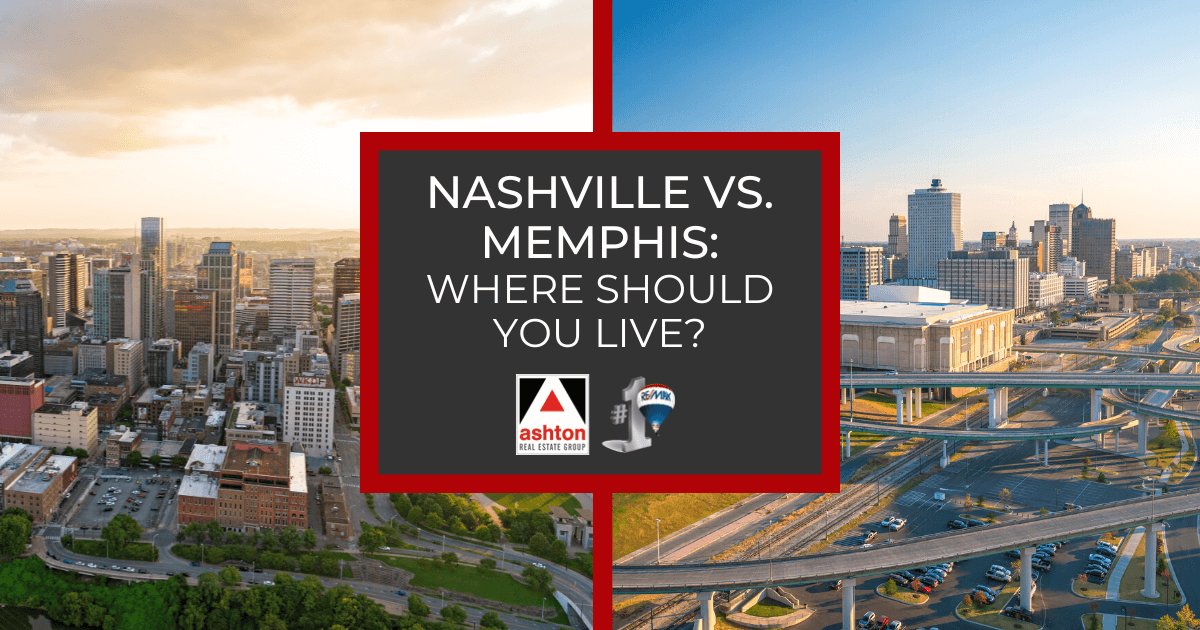
Nashville and Memphis, both iconic cities nestled in the heart of Tennessee, have long captivated the imagination of locals and visitors alike. Each city possesses a rich history, cultural significance, and distinctive character.
Nashville Economy vs. Memphis Economy
Though Nashville and Memphis are Tennessee's two largest economic centers, some significant differences between them showcase the notable differences in the two cities' economies.
Cost of Living
Overall, the cost of living in Nashville is higher across the board than in Memphis. The biggest difference is the average cost of buying or renting a home, with Nashville sitting far above the state and national average while Memphis comes in below both.
Homes for sale in Nashville list for a median price in the mid-$400s, which is nearly double that of Memphis. Rental home and apartment prices are similarly varied. The median rent for a one-bedroom in Memphis is about $900 per month compared to $1,500 in Nashville. The median rent for two to three-bedroom homes is in the $1,000–$1,300 range in Memphis versus $1,900–$2,400 in Nashville.
However, utility costs are relatively similar and average for Tennessee and the United States. It's a similar situation for healthcare spending. Grocery and restaurant prices are typically higher in Nashville, just 2% lower than the national average, while prices in Memphis are about 8% less than the national average. Gas prices vary due to supply, demand, and other factors but are lower in Memphis than in Nashville.
Job Market

While both cities offer large regional job markets, Nashville's is far more expansive and diverse. Unemployment in Memphis tends to be slightly above national rates, while Nashville sees lower rates than the country at large. Both are projected to see strong job growth outpacing the nation, but again, Nashville edges out Memphis on this metric.
Population change is an interesting and significant factor in each city’s job market. The two cities’ populations are comparable—around 630,000 in Memphis and 680,000 in Nashville—but Nashville’s population is growing, while Memphis’s has been shrinking. Therefore, in addition to the existing job market in Downtown Nashville, more jobs are expected in the future.
Nashville's average salary is in the mid-$50s, with a median household income in the mid-$60s. In comparison, Memphis' average salaries are in the high $40s. Both cities are below national levels in each category. Nashville and Memphis workers are subject to Tennessee's minimum wage of $7.25 per hour, which is the same as the federal minimum.
Top Industries & Biggest Corporations
Nashville and Memphis are home to radically different industries based on their geographic and cultural advantages, among other reasons. Memphis' location along the Mississippi River and near two major interstates makes it a top logistics and transportation hub, and they have a thriving manufacturing industry. In contrast, Nashville is famous for its music and entertainment scene (hence its "Music City" nickname), along with a growing tech sector. It also has numerous colleges and universities, including Vanderbilt University, Tennessee State University, Belmont University, and Lipscomb University.
Both Nashville and Memphis have economies strongly supported by visitors coming to check out their unique cultures, music, food, and other attractions. Naturally, this creates a massive hospitality and tourism scene, from hotels and bars to tours and local activities. Healthcare is also a major industry in the two cities, with numerous highly-rated hospitals, medical centers, and other facilities. Nashville has even been called the "healthcare capital of the United States."
Nashville's largest employers include Vanderbilt's Medical Center, Nissan, HCA Healthcare, and Saint Thomas Health. In Memphis, these are FedEx, Shelby County Schools, the local/state/federal government, and Methodist Le Bonheur Healthcare.
Overall, Nashville offers a larger, more diverse economy with higher wages. However, residents also see a notably higher cost of living. Memphis provides excellent opportunities for industrial or transportation-focused careers, as well as lower prices for housing and other expenses to make up for more moderate salaries.
Nashville Commutes vs. Memphis Commutes
Overall, drivers in each city should expect little difference in their commutes between Nashville and Memphis. Roughly eight out of 10 workers commute alone by car, with another 10% carpooling. Less than 5% of commuters in Memphis and Nashville get to work by mass transit, biking, or walking.
Traffic Patterns and What to Expect During Rush Hour
Data shows Memphis residents spend 43 hours a year in traffic, compared to 45 hours for those living and driving in Nashville. The average travel time to work is around 22–24 minutes in Memphis and 25–27 minutes in Nashville. Both cities are fairly moderate on these metrics, substantially lower than cities like Los Angeles, Chicago, Dallas, and Seattle.
Roughly one in five workers in each city commute less than 15 minutes each way. Traffic patterns follow typical rush hour flows, with a higher volume into town in the mornings and out in the afternoon. Nashville sees flows in all directions, while most of Memphis traffic comes to or from the suburbs to the east, north, and south.
Public Transportation
Each city offers public transportation systems of varying sizes and modes, though Nashville's is slightly larger. WeGo Public Transit operates Nashville's public transportation system, primarily consisting of a network of bus routes serving downtown Nashville, surrounding neighborhoods, and some outlying communities. Commuter bus service provides options for those who live further from the core, while those east of town can hop on the Star commuter rail, which travels as far as Lebanon. Two-hour bus passes cost $2, with one-way rail tickets priced at $5.25. Both also offer discounted rides on weekly or monthly passes.
In Memphis, public transit is provided by the Memphis Area Transit Authority (sometimes referred to as MATA). In addition to a city and region-wide bus system, MATA operates a trolley network centered on the downtown and tourist areas of the city. Fares generally cost $1–$2 per ride, with day and monthly passes available.
Residents with disabilities can take advantage of door-to-door paratransit in both cities. Both also offer bike-share programs, allowing residents to cycle one way and drop their bikes at convenient docks.
Best Suburbs in Each City for Short Downtown Commutes
Those who'd prefer a more suburban lifestyle have plenty of great choices for places to call home in the areas around Nashville and Memphis. Both cities are built with an extensive network of highways, interstates, and prominent local roads, making commutes relatively straightforward.
Nashville's top suburbs are mostly south of the city, including popular spots like Brentwood, Belle Meade, Franklin, Mount Juliet, and Nolensville. Brentwood and Belle Meade are typically 20 minutes or less to the heart of Nashville, while Franklin and Mount Juliet average about half an hour. Nolensville is the furthest, and it’s just under an hour from the city.
In Memphis, the best local suburbs are primarily located east and north of the city. Bartlett is among the closest (just 15–25 minutes to downtown), followed by the popular and well-known Germantown, about half an hour east. Other options include Collierville, Lakeland, and Arlington, all under an hour from the Memphis core.
Viewed as a whole, commuting in Memphis and Nashville is quite similar in time and options. However, Nashville may have a slight edge for those looking to take public transportation, and it has its most popular outlying communities a bit closer than Memphis. Nashville’s suburbs with easy commutes are also more varied than those surrounding Memphis.
What to Do in Nashville vs. What to Do in Memphis
No matter which city future residents pick, they won't be short on things to do. Tennessee's two largest cities offer a wide variety of ways to have fun for all tastes and budgets.
Outdoor Activities
Nashville and Memphis offer excellent spots to enjoy the gorgeous Tennessee weather and scenery. Memphis is famous for its location along the Mississippi River, which residents can enjoy from Tom Lee Park and Mud Island Park. There are also plenty of spots to fish from, and there are kayaking and boating launches. Other top choices include the amenity-rich Overton Park and the expansive, wilder Shelby Farms Park.
On the other hand, some of Nashville’s best parks are considered among the nation's top urban parks. The most famous of these is Centennial Park, known for its green space, dog park, and replica of Greece's Parthenon. There's also the Bicentennial Capitol Mall State Park, which offers equal parts history and nature just blocks from downtown. Would-be residents can't forget about Nashville's own waterfront space along the Cumberland, accessible via Riverfront Park and nearby multi-use trails.
Nashville and Memphis are also very close to many other beautiful areas, with some of the best spots in west and middle Tennessee, eastern Arkansas, northern Mississippi, and northern Alabama, all within distance of a day trip.
Nightlife
Nightlife is a vital part of Nashville and Memphis alike, with plenty of exciting restaurants, bars, music venues, and many more great spots for residents to explore!
In Memphis, the heart of nightlife is centered around historic Beale Street in the downtown area. The blocks between Main and 4th Streets are lined with many bars, clubs, music venues, restaurants, and shops, including longtime institutions like Silky O'Sullivan's and B.B. King's Blues Club. Those looking to avoid the tourist-heavy crowds can enjoy the more local-friendly Overton Square entertainment district in the Midtown neighborhood, the site of plentiful shopping, dining, and live theater.
Nashville’s nightlife hot spots are some of the most unique and rowdy in the world. Downtown Nashville’s best honky tonks are world-famous, and stops at one or more is a must for residents and visitors alike. Music City also offers top dining districts in Midtown and the Germantown neighborhood that are sure to keep foodies busy.
Sports
Sports fans will find plenty to love about both Memphis and Nashville, which are home to exciting pro sports as well as affordable amateur and minor league options.
Nashville is home to the NFL's Tennessee Titans, who play at Nissan Stadium in East Nashville, just across the Cumberland River from downtown. Downtown Nashville is also the site of Bridgestone Arena, where the NHL's Nashville Predators play their home games. In addition, college football fans can check out Vanderbilt University games at their impressive stadium on the school's Midtown Nashville campus. The minor league Nashville Sounds (a Triple-A affiliate of the Milwaukee Brewers) also play at First Horizon Stadium near the Germantown neighborhood. Finally, Major League Soccer's Nashville SC play their home games at Geodis Park.
Memphis offers professional basketball, with the NBA's Memphis Grizzlies, who play at FedEx Forum just off Beale Street. Nearby, the Memphis Redbirds (Triple-A affiliates of the St. Louis Cardinals) also call the city home, with their downtown AutoZone Park stadium. Additionally, the Memphis Tigers provide sports options for college fans, with notable basketball and football teams.
Music City or Mississippi River Living?
In the end, choosing between Nashville and Memphis is a matter of personal resonance with their unique vibes. Nashville's best neighborhoods, cosmopolitan energy, and booming entertainment scene cater to those seeking a dynamic urban lifestyle. Meanwhile, Memphis' soulful ambiance and historical depth appeal to those who cherish authenticity and rich cultural heritage. Whether you sway to the tunes of honky-tonk or find solace in the rhythms of the blues, both cities offer an inviting taste of Tennessee's vibrant soul.
If the opportunities of Nashville excite you, contact The Ashton Real Estate Group of RE/MAX Advantage with Nashville's MLS at (615) 603-3602 to get in touch with local real estate agents who can help find the perfect Nashville home for you today.





